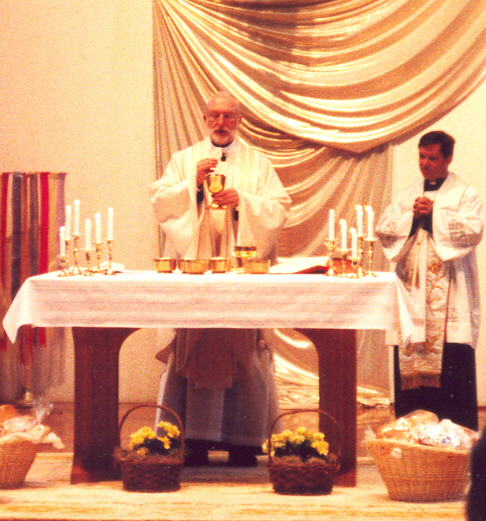
Return to
Index The Catholic Faith
Return to Level
Two Topic Index
Home Page
At Mass we celebrate the death and Resurrection of the Lord in a sacred banquet. These are truly matters for celebration - for taking time out for special activities to underline the significance of our redemption and to rejoice with Our Risen Lord.
However, this is no ordinary, casual celebration like a birthday party or a big family meal. This is a sacred celebration; it is holy. It is time consecrated to God, dedicated to him, set aside for him alone. Therefore we should approach this celebration with an attitude of reverence and profound respect. We express reverence by our attitude and our actions: by proper dress, by silence, by genuflection, by prayerfulness. When we understand this, we are ready to consider Holy Mass as a celebration. The mysteries we celebrate are worthy of the deepest awe. With Jesus, as with anyone whom we love, friendship and respect must go together. But Jesus is more than just a friend; he is God. We must never forget who he is and who we are; he is the Creator, and we are his creatures.
Sacred Banquet
What is the special activity which makes the Mass a celebration? It is the sacred banquet, the holy meal - Communion. A common meal has always been a way of celebrating important occasions. A big family meal is a good example of a celebration. We show that the cause for celebration is important to us, not only as individuals but as a family, a group, a community. It is important enough, in fact, to take a group of individuals, each of whom could have gone his own way, and bring them together in a unifying action. Why do we all do something together? Because it is important to us. Those who participate become part of something greater than any one person.
Table of the Lord

We have seen that the Mass is the representation of Christ's sacrifice on Calvary. We have watched and prayed with the priest, We now have the wonderful opportunity to go to Holy Communion, to receive Christ in the Eucharist.
In Old Testament sacrifices, the people offered God a gift, such as a lamb. The lamb was slaughtered to offer it up. But this was not all. To complete the religious ritual or celebration of the sacrifice, the people would eat the lamb. The gift that they offered was received back as a gift. The gift that they offered was received back as a gift. The people were trying to be in closer union with God by partaking of something that had been offered to and accepted by God.
As we have seen, the Mass is a sacrifice far greater than any other. It is the one and only perfect sacrifice. But here, too, the religious ritual is not really complete until we partake of the gift that has been offered.
We join the priest in offering Jesus to the Father; the Father accepts our gift and gives it back to us to eat. Therefore, the Mass is considered a feast, a meal, a sacred banquet. It can be thought of as a big family meal as long as two points are kept in mind: the family consists of all those joined in the brotherhood of Christ, and the food is the sacred Body and Blood of Christ. Holy Communion is meant to be received in the communal religious service which is the Mass. We are to go forward as God's family - not alone but in company.
In the Our Father, we pray for our "daily bread", expressing our trust in God who provides for all our earthly needs. On another level, our "daily bread" is Christ, the spiritual bread in the Eucharistic banquet that we need in order to be made holy.
And to pray to "our" Father, not just "my" Father, because we are meant to grow into the perfect unity of a happy and glorious community - a family - in the mystical Body of Christ.
Used with the permission of The Ignatius Press 800-799-5534
Return to
Index The Catholic Faith
Return to Level
Two Topic Index
Top
Home Page